The human body was not built for spaceflight, with its microgravity conditions, exposure to high-energy radiation and other issues. As a result, trekking beyond the Earth’s confines causes many physiological changes that affect an astronaut’s health.
The issue gained new currency with the March mission to return astronauts Butch Wilmore and Suni Williams to Earth after they were stranded on the International Space Station (ISS) for nine months.
WHY IS SPACE TRAVEL TOUGH ON THE HUMAN BODY?
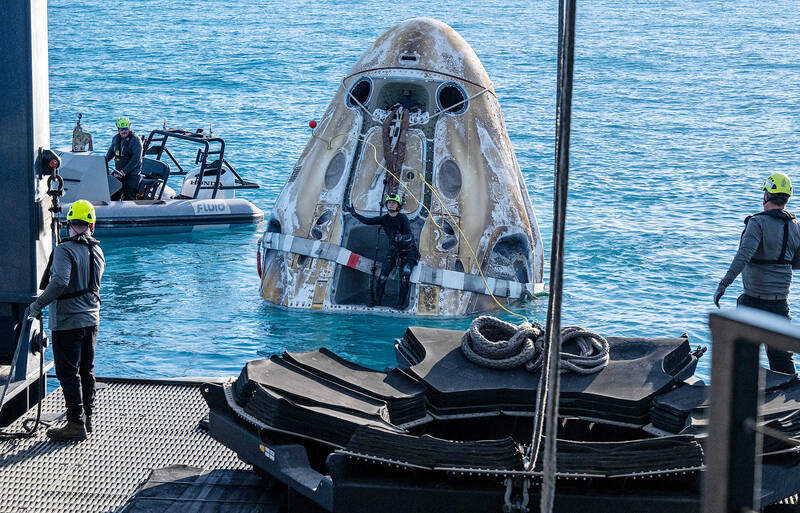
Photo: Reuters 照片:路透
The human body evolved over millions of years to function optimally in Earth’s environment, which includes its gravity, atmospheric composition and relatively low levels of radiation.
Space travel exposes people to quite a different environment, posing a range of physiological and psychological challenges, especially with prolonged exposure, according to Afshin Beheshti, director of the Center for Space Biomedicine at the University of Pittsburgh.
WHAT ARE THE HAZARDS OF SPACE RADIATION?
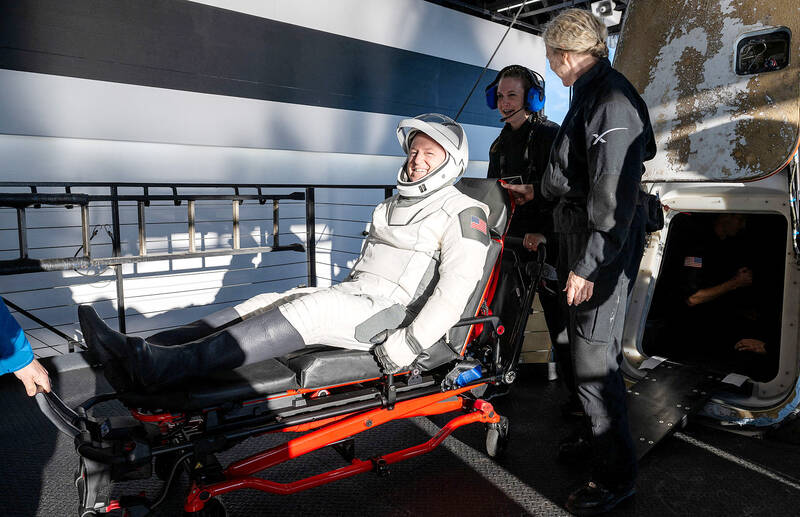
Photo: Reuters 照片:路透
Unlike on Earth, where the atmosphere and planetary magnetic field provide a shield from space radiation, astronauts are exposed to high-energy radiation permeating the cosmos. This can lead to DNA damage, increased cancer risk, neurodegenerative effects, cardiovascular issues and immune system dysregulation.
Earth’s magnetosphere — the region of space dominated by the planetary magnetic field — provides some protection for astronauts in missions in low-Earth orbit. But astronauts traveling beyond that — such as on missions to the moon or Mars — would experience much higher radiation doses.
WHAT DOES MICROGRAVITY DO?
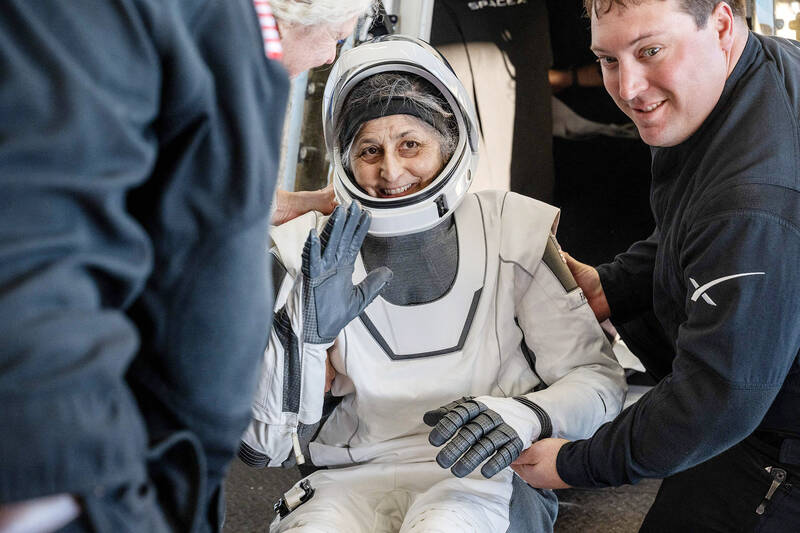
Photo: AFP 照片:法新社
Gravity plays a critical role in regulating bodily functions. Its absence triggers widespread physiological adaptations, according to Beheshti.
Without gravity, bodily fluids shift upward, leading to facial swelling and increased intracranial pressure, which can affect vision. The lack of mechanical loading on bones and muscles associated with the downward pull of gravity leads to bone density loss and muscle atrophy.
In addition, the cardiovascular system undergoes major changes, including difficulty regulating blood pressure upon return to Earth. Prolonged exposure to microgravity conditions also affects vestibular function — the inner ear’s ability to sense movement and orientation. That can cause balance and coordination issues.
HOW ABOUT CONFINEMENT AND PSYCHOLOGICAL STRESS?
Long-duration space missions require astronauts to live in confined and isolated environments with limited social interaction and exposure to natural stimuli. This, according to Beheshti, can lead to psychological stress, sleep disturbances, cognitive performance declines and mood disorders.
The effects of prolonged isolation and close-quarters living among astronauts — during stints aboard space stations or longer future missions to destinations like Mars — could aggravate interpersonal conflicts, further impacting mental well-being and mission performance.
WHAT HAPPENS AFTER RETURNING TO EARTH?
How astronauts recover after returning to Earth depends in large part on mission duration. For short-duration missions of a few days in low-Earth orbit, about 95 percent of the biological damage sustained appears to be reversed upon return.
For astronauts who spend months aboard the ISS, recovery appears proportional to their time in space. Many physiological systems gradually return to normal. But some issues persist. One example is Spaceflight-Associated Neuro-Ocular Syndrome (SANS), linked to vision impairment due to microgravity-induced fluid shifts and changes in intracranial pressure affecting the eyes. Research suggests that dysfunction in subcellular structures called mitochondria plays a role in SANS. Some astronauts experience lasting impairment that may require corrective lenses.
HOW ABOUT HAVING BABIES IN SPACE?
One significant knowledge gap is how spaceflight affects human reproduction and fetal development, according to Beheshti. Limited studies have been conducted on reproductive health in space, mostly involving animals such as mice. The complete implications for human fertility, embryonic development and long-term space habitation spanning generations remain unknown. This is especially important as humankind considers future space colonization efforts.
Research published in 2022 documented bone loss in 17 ISS astronauts in missions averaging about 5-1/2 months. A year after returning to Earth, the astronauts on average exhibited 2.1 percent reduced bone mineral density of the tibia — one of the bones of the lower leg — and 1.3 percent reduced bone strength. Nine did not recover bone mineral density after the spaceflight.
(Reuters)
人體並不是為太空飛行而生的,太空飛行有微重力環境、高能量輻射等問題。因此,離開地球這範圍,會導致許多生理上的變化,影響太空人健康。
三月的任務,將困在國際太空站九個月的太空人布奇.威爾莫和蘇妮.威廉斯載送回地球,讓此問題再度受到關注。
太空旅行為何是對人體的嚴苛考驗?
人體經過數百萬年的進化,才能在地球的環境中發揮最佳功能,這些環境條件包括重力、大氣成分和相對較低的輻射。
美國匹茲堡大學太空生物醫學中心主任阿夫辛.貝赫什提表示,太空旅行將人置身於完全不同的環境中,帶來一系列生理和心理挑戰,尤其是長時間暴露在太空中。
太空輻射有哪些危害?
地球上的大氣層和行星磁場可以阻隔太空輻射,但太空人會暴露在遍布宇宙的高能量輻射中。這會導致DNA損傷、增加癌症風險、神經退化、心血管問題和免疫系統失調。
地球磁層—由行星磁場影響的太空區域—為執行低地球軌道任務的太空人提供一定程度的保護。但超出此範圍的太空人—例如執行月球或火星任務—將受到更多的輻射。
微重力有何作用?
重力在調節身體機能中扮演至關重要的角色。貝赫什提表示,若沒有重力,全身都會產生變化來適應。
沒有重力,體液會向上移動,導致臉部腫脹和顱內壓升高,進而影響視力。沒有向下拉的重力,會讓骨骼和肌肉缺乏機械負荷,導致骨密度下降和肌肉萎縮。
此外,心血管系統也會發生重大變化,包括返回地球後難以調節血壓。長期處於微重力環境下也會影響前庭功能,即內耳感知運動和方向的能力。這可能會導致平衡和協調問題。
隔離和心理壓力
長期的太空任務要求太空人生活在狹小而孤立的環境中,很少有社交互動和自然刺激。貝赫什提認為,這會導致心理壓力、睡眠障礙、認知能力下降和情緒障礙。
太空人在太空站工作期間,或未來前往火星等目的地執行更長時間的任務時,長期與世隔絕和太空人之間的近距離生活可能會加劇人際衝突,進一步影響心理健康和任務表現。
返回地球後會怎樣?
太空人返回地球後的恢復情況,很大程度上取決於任務的時間長度。對於在低地球軌道執行數天的短期任務而言,大約95%的生物損傷在返回地球後似乎會逆轉。
對於在國際太空站(ISS)上度過數月的太空人來說,恢復時間似乎與他們在太空的時間成正比。許多生理系統逐漸恢復正常,但一些問題仍然存在。其中一個例子是太空飛行相關神經眼綜合症(SANS),它與微重力引起的液體轉移和影響眼睛的顱內壓改變所導致的視力障礙有關。研究顯示,亞細胞結構粒線體的功能障礙在SANS中起著一定作用。有些太空人會遭受長期的損傷,可能需要配戴矯正鏡片。
如果在太空生孩子呢?
貝赫什提表示,一個重大的知識空白是太空飛行對人類生殖和胎兒發育的影響。關於太空生殖健康的研究有限,大多是對老鼠等動物的研究。對於人類生育能力、胚胎發育以及跨越數世代人的長期太空居住的全部影響仍然未知。人類考慮未來的太空殖民時,這一點尤其重要。
2022年發表的研究,記錄了17名國際太空站太空人在平均約五個半月的任務中出現骨質流失的情況。返回地球一年後,太空人的脛骨(小腿的骨頭之一)的骨礦物質密度平均降低了2.1%,骨強度降低1.3%。有9人在太空飛行後骨密度未能恢復。
(台北時報林俐凱編譯)

A: Apart from megahit “KPop Demon Hunters,” what else is worth watching? B: The new shows featuring four top-tier actors – Xiao Zhan, Wang Yibo, Yang Yang and Li Xian — are all popular. A: Yang’s TV drama, “The Immortal Ascension,” is definitely one of the summer sizzlers. Some praise it as the Eastern edition of the glorious “Harry Potter” series. B: Yeah, the costume fantasy drama is about a young man’s journey to immortality. All the magic powers and magical tools in the show are just stunning. A: Let me go stream it now. I wanna
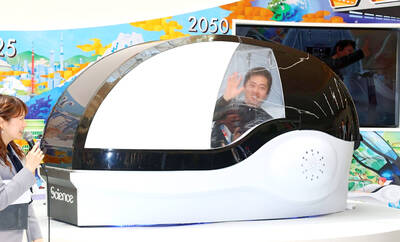
An automated human washing machine was one of the highlights at the Osaka Kansai Expo, giving visitors a glimpse into the future of personal hygiene technology. As part of the event, 1,000 randomly selected visitors were given the chance to try out this cleansing system. The machine operates as a capsule-like chamber where warm water filled with microscopic bubbles gently washes away dirt. The 15-minute process also includes a drying phase, removing the need for users to dry themselves manually. Equipped with advanced sensors, the device monitors the user’s biological data, such as their pulse, to adjust water temperature and other settings

Britain’s National Gallery announced on Sept. 9 that it will use a whopping £375m (US$510m) in donations to open a new wing that, for the first time, will include modern art. Founded in 1824, the gallery has amassed a centuries-spanning collection of Western paintings by artists from Leonardo da Vinci to J.M.W Turner and Vincent van Gogh — but almost nothing created after the year 1900. The modern era has been left to other galleries, including London’s Tate Modern. That will change when the gallery opens a new wing to be constructed on land beside its Trafalgar Square site that is currently
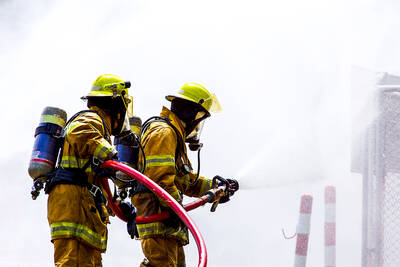
Firefighters might face an increased risk of developing “glioma,” a type of brain cancer, due to certain chemicals encountered on the job. A recent study analyzed glioma cases and found clear connections between the genetic patterns of affected firefighters and their exposure to these harmful substances. The study found that firefighters exhibited significantly higher levels of specific mutational signatures in their glioma cells compared to individuals in other occupations. These signatures — unique patterns of genetic changes in DNA — help scientists trace the source of mutations. Earlier research has associated these mutations with certain chemicals found in fire